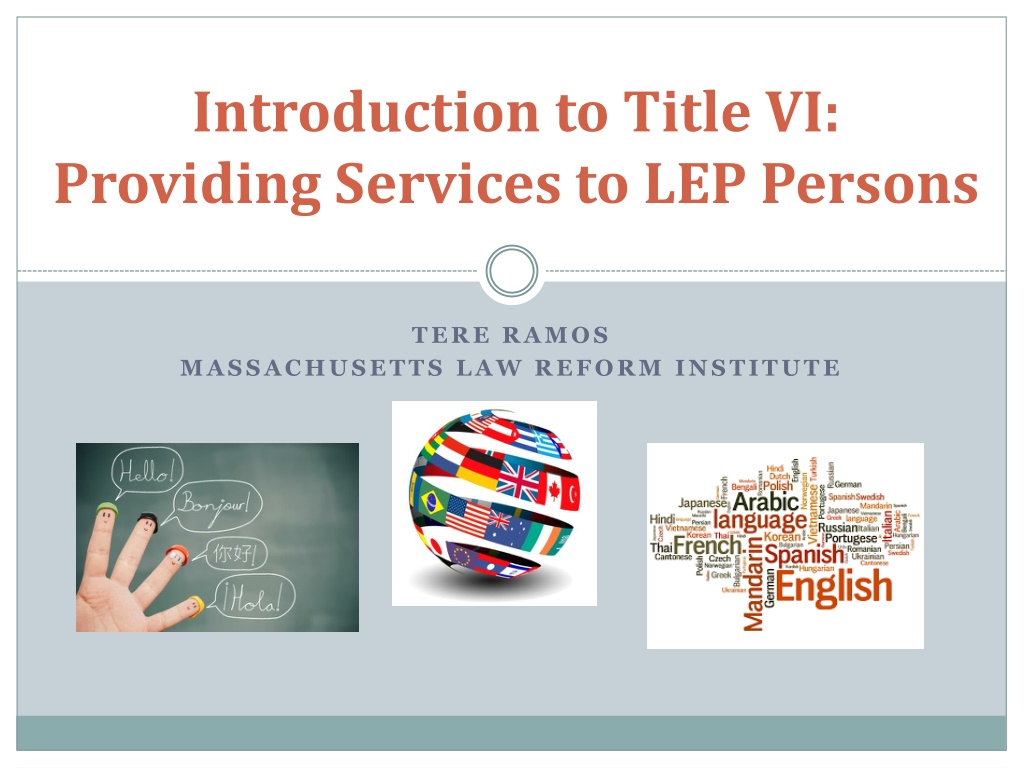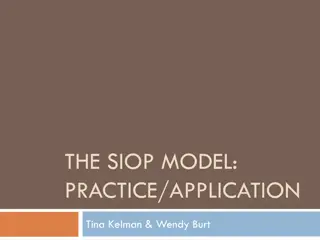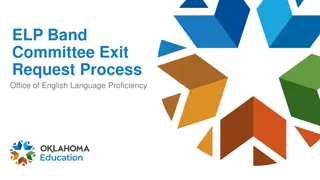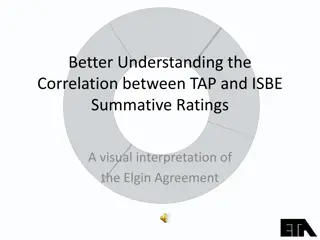Understanding Language Rights and Title VI Requirements for Limited English Proficient Individuals
Providing services to Limited English Proficient (LEP) individuals is essential to ensure equal access to programs and activities receiving federal financial assistance. Title VI of the Civil Rights Act of 1964 prohibits discrimination based on race, color, or national origin. It is crucial to address the language needs of LEP persons to prevent unintentional discrimination and ensure inclusivity in decision-making processes. This introduction sheds light on the importance of language rights and the obligations under Executive Order 13166 to provide language access and translation services to LEP individuals. Understanding who qualifies as an LEP person and the legal requirements outlined by Title VI is vital for promoting diversity and inclusiveness in service provision.
Download Presentation

Please find below an Image/Link to download the presentation.
The content on the website is provided AS IS for your information and personal use only. It may not be sold, licensed, or shared on other websites without obtaining consent from the author. Download presentation by click this link. If you encounter any issues during the download, it is possible that the publisher has removed the file from their server.
E N D
Presentation Transcript
Introduction to Title VI: Providing Services to LEP Persons TERE RAMOS MASSACHUSETTS LAW REFORM INSTITUTE
MassLegalHelp is Available https://www.youtube.com/watch?v=Te1NLUWNMws
A Country of Immigrants http://www.nytimes.com/interactive/2009/03/10/us/20090310-immigration-explorer.html?hp
Why Do Language Rights Matter? U.S. becoming a majority minority country. In MA, 22% of the population speaks a language other than English at home. Provides access to decision making. Without them a person may unknowingly waive rights to services. It is discrimination, same law as if person is not provided services due to color of skin or race.
Who is an LEP person? Individual with a limited ability to read, write, speak, and understand English. Can be the family member of an English speaker who is involved in the care of that person. Person does not have to be limited in all speaking, reading, writing and comprehending. Flexibility in addressing needs should not diminish, and should not be used to minimize the obligation that those needs be addressed. Must take reasonable steps to ensure access. EXECUTIVE ORDER 13166
The Legal Argle Bargle Title VI of the Civil Rights Act of 1964 prohibits discrimination based on race, color, or national origin in programs or activities that receive federal financial assistance: No person in the United States shall, on the ground of race, color, or national origin be subjected to discrimination under any program or activity receiving federal financial assistance. 42 USC 2000d
Language Access Translation Where a significant number or proportion of the population eligible to be served or likely to be directly affected by a federally assisted program ... needs service or information in a language other than English in order effectively to be informed of or to participate in the program, the recipient shall take reasonable steps, considering the scope of the program and the size and concentration of such population, to provide information in appropriate languages to such persons. This requirement applies with regard to written material of the type which is ordinarily distributed to the public. 28 C.F.R. 42.405(d)(1)
MA Also Prohibits Discrimination Chapter 151B prohibits discrimination due to race, color, religious creed, national origin, ancestry or sex. MA Executive Order 526 prohibits discrimination in all state agencies and programs funded by the state, including language access. MA Language Access Guidelines (ANF Administrative Bulletin #16) created to: (a) Improve access for LEP persons; (b) Reduce disparities and delays, in the provision of state services/programs to LEP persons; (c) Increase agency effectiveness and public satisfaction.
National Origin In Lau v. Nichols (1974), the Supreme Court holds that language is a proxy for national origin and that national origin discrimination includes failing to provide LEP individuals meaningful access to recipient programs.
Alexander v. Sandoval 532 U.S. 275 (2001) No private right of action to enforce disparate impact regulations under Title VI. Supreme Court established that private right of actions need to be established by Congress. Some states have restored this right by passing laws that provide a private right of action for violations of state anti- discrimination laws.
Executive Order 13166 In 2000 Bill Clinton signs Executive Order 13166, providing further guidance on language access in all federally funded programs. Every federal agency creates their own guidance and plans for providing language access in all of their funded programs or activities. http://www.hhs.gov/civil-rights/for-individuals/special-topics/limited- english-proficiency/guidance-federal-financial-assistance-recipients-title-VI/
What is a Recipient? Entity that receives federal financial assistance and/or operates a program or activity. Title VI coverage extends to all recipient and sub- recipient operations. Includes grants, sub-grants, loans, equipment, federal property (whether it is leased or provided), personnel.
What Does This All Mean? LEP Persons have the same right as anyone else to use public programs in their language. In all: schools, courts, public housing, public programs like EI and Head Start In most: hospitals, doctors offices Staff of public programs must: Talk in the person s language Help them as quickly as they can Respect the client s culture This is a right, not a gift!
What are the Language Rights? An Individual with a limited ability to read, write, speak, and understand English has the right to: Use public programs and communicate in the preferred language. Set a language preference to receive vital written materials. Right to an interpreter that is free, qualified, trained in subject, impartial, and ensures person understands what everyone says. Even if the person has some command or knowledge of the language, if they understand their own language better, they can ask for services!
What Are The Program Obligations? Inform individuals with LEP that language assistance is available at no cost. Provide language interpreter services that are free and adequate (even if the client speaks some English). Provide vital documents in the most common languages of LEP clients likely to be served.
What are Vital Documents? Depending on the frequency of the language, important written information that must be translated! These include: Applications to participate Complaint and intake forms Notices of rights or program administration Written notices of rights Appeal letters Assessments used to determine eligibility or services School documents Standard forms that are considered vital to a program Content on website It if is a vital notice, it usually must be provided in a native language. If the person self-identifies as LEP, offer it!
Language Access Plan Create a simple language access plan to share with staff and ensure it is implemented. Include: Process to identify LEP individuals who need language services How LEP community interacts with Agency Process to access interpreters and language assistance services Determine which documents to translate and how to find them Train staff on policies and procedures Create and provide a notice that services are available Designate an office or official to monitor and update the plan Number or proportion of LEP persons Nature and Importance Frequency of Contact 4-factor analysis Resources Available
Who is an appropriate interpreter? NOT Appropriate: Minor children Appropriate: Professional Trained in subject Qualified Impartial Doesn t know subject or terms Unqualified to translate Partial
What an Interpreter Can and Cannot Do An interpreter cannot: An interpreter should: Treat you with respect Change your words Make sure they understand what you say Leave out information Talk about you Make sure you understand what they say Take sides Interpret everything you say and the program says Tell you what you should do
In Conclusion Title VI requires recipients to provide meaningful access to LEP individuals. Recipients should have written LEP plans, policies, and procedures. Federal agencies can investigate complaints and enforce Title VI protections. In MA, person can also make complaint at state level with funding agency or at MCAD.
Resources Federal Interagency Working Group on Limited English Proficiency: www.lep.gov Language Access Assessment and Planning Tool http://go.usa.gov/jpJ U.S. Department of Justice s Civil Rights Division at www.justice.gov/crt/about/edu/ National Center for Cultural Competence, Working with Linguistically Diverse Populations, http://nccc.georgetown.edu/features/language.html DOJ Title VI Legal Manual, https://www.justice.gov/crt/department-justice- manuals-concerning-title-vi-civil-rights-act-1964
Resources Language Assistance Self-Assessment and Planning Tool for Recipients of Federal Financial Assistance, http://www.region4ta.us/documents/PATH_Langu age_Access_Self_Assessment.pdf Sample of amazing language access plan, AZ Department of Economic Security, https://des.az.gov/sites/default/files/legacy/dl/DES -1-01-34-Limited-English-Proficiency-for-Client.pdf Boston Housing Authority Language Access Plan, https://www.bostonhousing.org/BHA/media/Docu ments/CCECR/BHA-LEP-Policy.pdf

 undefined
undefined
















































